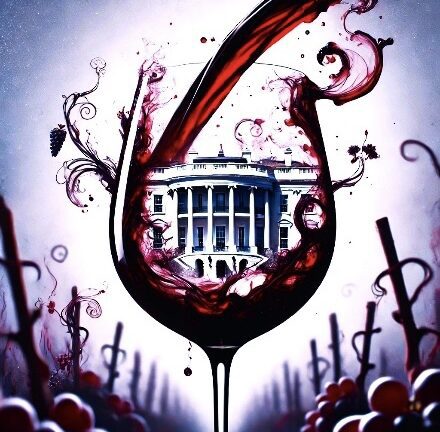In the battle between the White House and the wine industry, the outcomes are unevenly distributed. While small and mid-sized producers struggle, major corporations with diversified portfolios and strong domestic distribution networks may weather the storm as they can absorb costs, leverage lobbying power, and even benefit if tariffs make foreign wines more expensive.
The U.S. government is using tariffs as a bargaining chip in trade disputes, but the current situation is more complex. President Trump has threatened to impose 200 percent tariffs on European wines, champagnes, and other alcoholic products in response to EU tariffs on American whiskey. This threat has not yet been implemented, but it has already caused uncertainty in the wine industry.
If implemented, these tariffs would likely harm American wine businesses rather than benefit them. Importers, distributors, retailers, and restaurants that rely on European wines would face significant financial challenges. Many industry experts argue that American wines cannot simply replace European wines in the market, as wine is not a fungible commodity.
Tariffs are more likely to lead to overall market contraction, with consumers potentially shifting away from wine altogether due to higher prices and reduced choices. While some consumers might shift to beer, spirits, or non-alcoholic alternatives, this would not necessarily benefit those industries in the long term. The disruption to the entire alcohol distribution network could have far-reaching negative consequences across all sectors.
The proposed tariffs are more likely to cause widespread hardship in the U.S. wine industry, potentially leading to job losses, business closures, and reduced consumer choice, rather than creating clear winners and losers.
Loss
Tariffs and retaliatory measures make it harder to export U.S. wine, definitely hurting vineyards and small to mid-sized producers. Rising costs and labor shortages further strain their operations. Higher wine prices, limited selection, and economic uncertainty impact wine lovers. Consumers end up paying more, with fewer choices on store shelves. A disrupted supply chain, price volatility, and reduced demand put stress on wine shops (on and off line), restaurants, and distribution networks. Many smaller businesses may face financial hardship or closures.
Regions like Napa and Sonoma in California, the Finger Lakes in New York, and Oregon’s Willamette Valley rely heavily on wine tourism. A struggling wine industry could lead to reduced tourism revenue, job losses, and economic downturns in these areas.
Contradictions
Trump’s position on states’ rights versus federal intervention has often appeared contradictory. While he has expressed a desire to shift more power to state governments, his economic and trade policies, including tariffs affecting the wine industry, are examples of strong federal action that overrides state-level interests.
Authority
The U.S. Constitution (Article I, Section 8, Clause 3) grants Congress the power to regulate commerce with foreign nations, commonly referred to as the Commerce Clause. Additionally, Article II gives the President authority over foreign policy, including trade negotiations. This means that tariffs, trade agreements, and other foreign economic policies are under federal jurisdiction, not state control.
The President can impose tariffs using powers delegated by Congress, such as the Trade Expansion Act of 1962 (Section 232) or the Trade Act of 1974 (Section 301). Trump has used Section 232 tariffs on steel and aluminum, as well as Section 301 tariffs to address trade disputes, including proposed tariffs on European wines.
Why the Contradiction?
Trade policy, including tariffs, falls under the federal government’s authority. Trump’s administration has prioritized using tariffs as a tool to negotiate trade deals and leverage economic pressure against foreign nations, particularly Canada and the EU. While this impacts wine-producing states like California, Oregon, and Washington, the states themselves have no power to override federal trade policy.
Trump has framed his economic strategy as “America First,” prioritizing industries he sees as central to national strength, such as manufacturing and energy, often at the expense of sectors like wine that rely on global markets. His tariffs on European wines and Canadian trade retaliation have hurt U.S. wine producers, but his focus remains on broader geopolitical leverage rather than industry-specific concerns.
While advocating for states’ rights in areas like education, public health, and social issues, Trump uses federal power aggressively when it aligns with his political and economic agenda. Trade, tariffs, and federal regulations serve as tools to exert control over national economic policy, even when it conflicts with his rhetoric of decentralization.
Trump’s approach can be seen as “selective federalism”—favoring state power when it aligns with his political base but using federal authority when it serves his economic and political objectives.
Pragmatism
Trump’s policies reflect a pragmatic rather than ideological approach to governance. His administration’s intervention in trade and tariffs contradicts his states’ rights rhetoric because these areas serve his broader economic and political strategy. The wine industry, caught in the crossfire, suffers from policies that prioritize national-level trade battles over local industry concerns.
Limited State Power Over Trade Policy
States like Oregon, California, New York, Texas, Missouri, and Georgia can lobby against tariffs and advocate for relief, but they cannot unilaterally block or delay federal trade policies. While state legislatures can regulate aspects of alcohol distribution within their borders (under the 21st Amendment, which repealed Prohibition), they have no authority over international trade. States can challenge federal trade policies in federal court, but legal precedent generally supports the federal government’s supremacy in this area.
Getting Away with It
It would be terrific if the US wine industry could, collectively or individually, convince the leadership in Washington, DC to cease and desist. There are many ways to negotiate trade deals, and destroying the wine industry, a serious economic engine, is not the right strategy. Unfortunately, there are very few pathways for the wine industry to grab the reins of power out of the hands of the Federal government
Strategies to Address Issues
The U.S. wine industry can engage policymakers to highlight its economic and cultural significance globally. By showcasing success stories of U.S. wines fostering international relationships the industry can emphasize its role as a soft power tool. Campaigns celebrating U.S. wines as symbols of craftsmanship and innovation can target domestic and global audiences, reinforcing their connection to American values and quality.
Incorporating U.S. wines into diplomatic events like state dinners and trade missions can elevate their status as cultural ambassadors, strengthening ties with other wine-producing nations. Presenting data on the industry’s $276 billion economic impact, including 1.84 million jobs and contributions to tourism, agriculture, and exports, can help policymakers understand its broader importance.
Collaborations with influential figures in politics, business, and culture can amplify visibility and prestige for U.S. wines on the global stage. Such efforts position the wine industry as a significant player in promoting American values while supporting economic interests worldwide.
Bottom Line
While the White House uses economic leverage to push its agenda, the wine industry—especially small producers, farmers, and consumers—pay the price. The long-term impact will depend on how these policies evolve and whether the industry can adapt to the shifting landscape.





